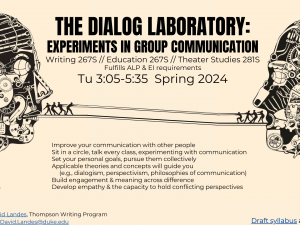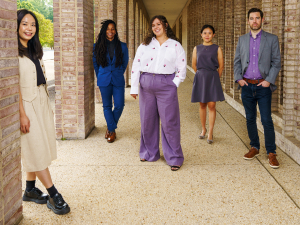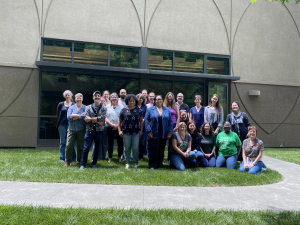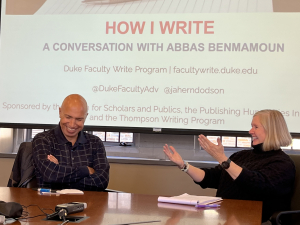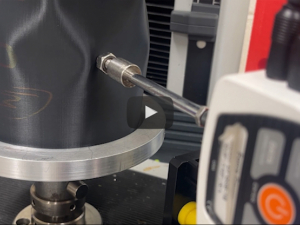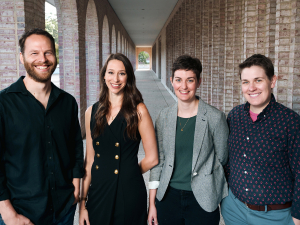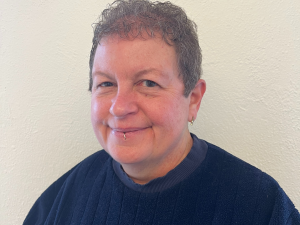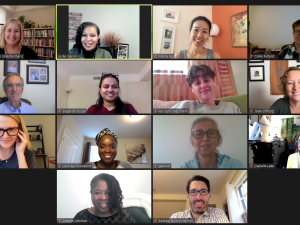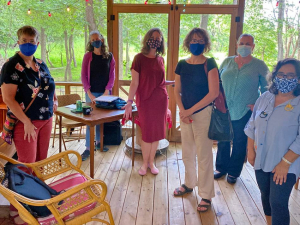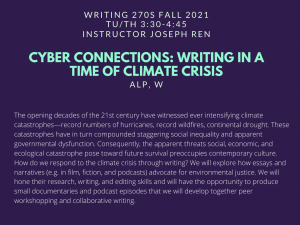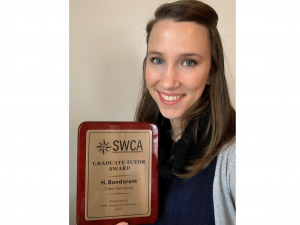Five new scholars are joining the Thompson Writing Program this fall. (John West/Trinity Communications) That text you just sent your mom. The report that’s due on Friday. The many DMs from friends still awaiting replies. Most of us employ writing every day as a means of communicating with others. But we may forget that it is also an act that can tell us a lot about ourselves.Five new faculty members in Thompson Writing Program are helping Duke students, and occasionally their faculty… read more about Crystallizing Identity and Connecting Through Writing »
Four faculty in the Trinity College of Arts & Sciences were recently recognized by the Arts & Sciences Council for outstanding achievements in undergraduate teaching.Members of the council — in collaboration with the dean's office — choose the award recipients each year by considering student evaluations, teaching statements and recommendations from colleagues as part of the selection process. Four awards are given each year, spanning the breadth of undergraduate disciplines offered in the college.“The winners… read more about Four Trinity Faculty Receive Undergraduate Teaching Awards »
Twenty-eight writers across disciplines and career phases gathered for the annual Faculty Write Program Scholarly Writing Retreat and Workshop, May 15-17, 2023. For three days, participants made progress on their own writing projects, connected with fellow writers, and learned strategies to support their writing practice during the retreat, and after the retreat ended. Throughout the retreat, facilitators Jennifer Ahern-Dodson and Monique Dufour led workshops on topics including “Getting Unstuck,” “… read more about Writers attend annual summer retreat »
Though her office is small, it is filled with the stories of former students. Printed out copies of journal articles and clippings from graphic novels are pinned to her walls. Essays and collections cover her desk. She proudly points them all out, explaining the research these papers originated from and how excited she is to have them published in various journals. She looks at one, explaining how the essay’s author writes about the plight of the “no-no boys,” a group of Japanese American men deemed disloyal during World… read more about From Footnote to Main Idea: Award Winner Teaches Writing via Asian American Narratives »
As a first-year student at Duke, Brooke Harmon didn’t know she would need a mentor – or two, or three – to help guide her through college.But what she didn’t look for, she found nevertheless. Now a senior, Harmon boasts an important, vast and diverse web of friends, confidants, advisers and mentors who she has leaned on throughout her collegiate journey. This group – a personal, informal board of directors of sorts – has proven valuable to Harmon and is the sort of support system Duke’s career counselors and other student… read more about On Students Finding Advice and Help Along the Duke Journey »
There are many recipes out there for strawberry shortcake, but Rhiannon Scharnhorst only asks her students to analyze three: One created by Betty Crocker, the second by celebrity chef Emeril Lagasse and a third by blogger Deb Perelman for her Smitten Kitchen website. “We talk about what we see and what is the same and different in what students consider to be a pretty boring genre,” Scharnhorst explains. “Who Emeril is writing towards and who Betty Crocker is writing towards are very different — and that’s rhetoric. That’s… read more about Four New Scholars Forge Connections and Explore Context Through Writing – In All Its Forms »
Congratulations to Jamie Browne for being Awarded the 2022 SWCA (Southeastern Writing Center Association) Professional Tutor Award for her writing center work. “Am I talking too much? I want to be sure other folks have a chance to chime in…” These words, frequently spoken by Jamie Browne at the TWP Writing Studio’s weekly staff meetings, are invariably met with “no…please…go right ahead!” The chance to hear from this consummately thoughtful, inclusive, and collaborative professional tutor is invariably a chance to learn… read more about The TWP Writing Studio’s Jamie Browne Awarded 2022 SWCA Professional Tutor Award »
As an early career faculty member at East Carolina University, Jennie Ann Cole strives to balance her teaching and research on community engagement in health and human performance. One of the challenges she faces is finding time to dedicate to writing. On October 22, 2021she gathered with dozens of other engaged scholars across the state to do just that by participating in the fourth annual North Carolina Engaged Scholar Writing Retreat. read more about Fourth Annual Writing Retreat Supports Community Engaged Scholars Across The State »
Writing can be a solitary and lonely process for Cecilia Márquez, assistant professor in the Duke History Department. Amid teaching classes and other activities, setting aside time to work on her first book that explores the experiences of Latinos in the American South from 1940 to present can be challenging. That’s why the Duke Faculty Write Program has been a helpful resource for Márquez since she joined Duke in 2019. “To me, writing can be a very isolating process, and the challenges associated with writing can feel… read more about A Community of Writers Cultivates Collaboration »
Check out the Thompson Writing Program's Fall 2021 Featured Writing Course! Writing 270S Fall 2021 Tuesday/Thursday 3:30-4:45 Instructor: Joseph Ren Cyber Connections: Writing in a Time of Climate Crisis ALP, W The opening decades of the 21st century have witnessed ever intensifying climate catastrophes-- record numbers of hurricanes, record wildfires, continental drought. These catastrophes have in turn compounded staggering social inequality and apparent governmental dysfunction/ Consequently, the apparent… read more about TWP's Fall 2021 Featured Writing Course »
DURHAM, N.C. -- Plagiarism – reprinting another person’s work word-for-word without credit -- is a firing offense in most workplaces and can easily get a college student suspended or even expelled from school. But what about so-called ‘self-plagiarism,’ reusing your own words? It depends, says a group of scholars who have spent years studying text recycling in STEM fields and developing clear guidelines specifically for researchers. “There’s nothing clear and authoritative out there,” said Duke professor of the practice… read more about Text Recycling Project Provides Guidance on 'Self-Plagiarism' »
A March 24 panel discussion in response to the increase of violence against people of Asian descent, including the mass shootings in Atlanta earlier this month, attracted more than 670 Duke faculty, staff and students. Moderated by Nayoung Aimee Kwon, the online event featured presentations on the historical context of anti-Asian violence from Susan Thananopavarn, Eileen Chow and Esther Kim Lee. Syllabus on Asian-American History and Culture In response to recent acts of violence against Asian Americans stemming from a… read more about The History of Violence Against Asian Americans »
The Office for Faculty Advancement has awarded seed grants to 14 faculty-led projects exploring new ideas and expanding existing initiatives to promote an equitable and inclusive academic environment at Duke. The theme for this cycle was "Confronting Racism and Bias: Fostering an Inclusive Community." Faculty Advancement Seed Grants provide a financial head start for novel faculty development initiatives within academic units.2021-22 Faculty Advancement Seed GrantsArt, Art History and Visual Studies Anti-Racist Pedagogy… read more about Seed Grants Help Faculty Lead the Way in Confronting Racism and Bias »
Congratulations to H. Bondurant for being Awarded the 2021 SWCA (Southeastern Writing Center Association) Graduate Tutor Award for their Writing Center Work and Service. In H.’s time as a consultant at the TWP Writing Studio at Duke University, they have exemplified the spirit of writing center work in their commitment to equity, inclusion, and collaboration. To drop into one of H.’s Graduate Writing Lab sessions is to enter a warm community of writers, with H. providing guidance in goal setting and self-assessment, all… read more about Bondurant Awarded 2021 SWCA Graduate Tutor Award »
As educational institutions seek ways to enhance opportunities for students during the pandemic, the College Board has tapped five Duke University professors to provide recorded lectures to millions of advanced high school students around the world. The new lecture series, called “AP Daily,” offers free, online videos across a variety of college-level topics to students who are learning in person, remotely or in blended learning environments. Students can view the videos independently or Advanced Placement (AP)… read more about Comer Featured in Faculty Lecture Series for Advanced Placement High School Students »
